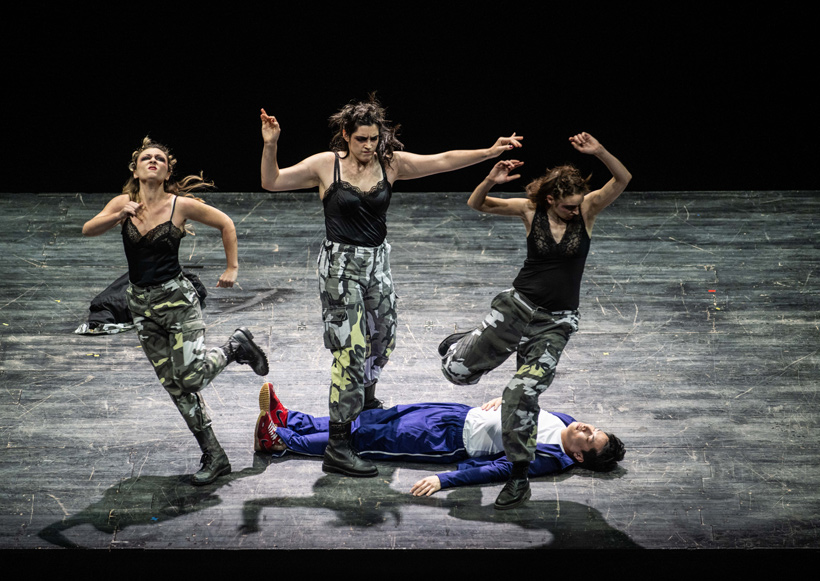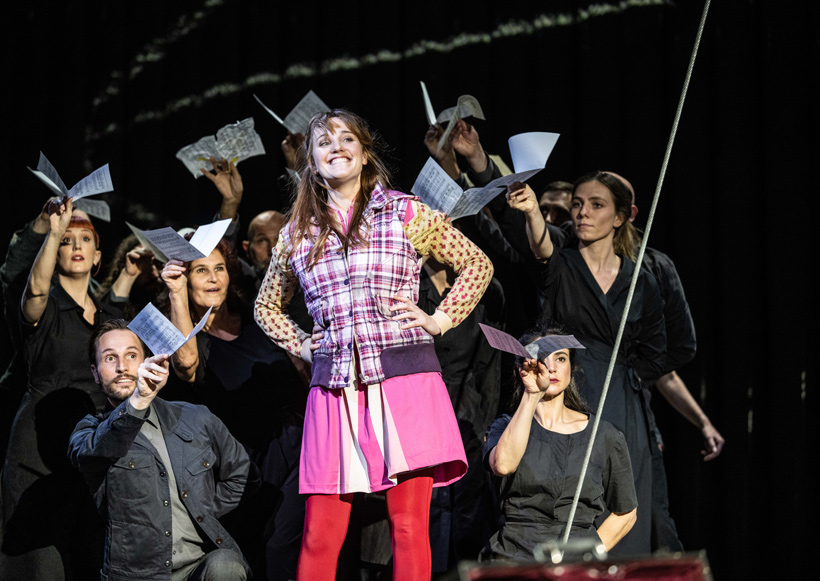
Die Zauberflöte today
We easily seem to forget — or perhaps we never realised — that the world of Die Zauberflöte is far from harmonious.
When we attempt to reconstruct the events leading up to the story, we find more or less the following: the Queen of the Night was deprived of her power after the death of her husband. Shortly before his death, he voluntarily donates the all-consuming sevenfold sun-circle, the emblem and source of his power, to the Initiates in the hope that their supreme priest Sarastro would ‘manfully’ take control of it. She, the Queen, has been sidelined completely. It is therefore hardly surprising that this unilateral transfer of power has already caused huge tension and enmity between the Queen and Sarastro by the start of the opera.
But the conflict is not restricted to this personal hostility. At the macro level too, the conflict plays out in the dualities between light and darkness, day and night, the sun and the moon, nature and culture, and between man and woman. The world of Die Zauberflöte is a world of divisions, a ruptured community with no place for the paradisiacal complacency in which people move unthinkingly through their surroundings. Only the somewhat naive Papageno appears to be a distant echo of that ideal — appears, because he too ultimately ends up with serious doubts. The young generation has to navigate a world torn apart by the conflict between members of the older generation. Tamino, Pamina and Papageno too are wandering characters, feeling their way, doubtful, vulnerable and often fearful – who can really be trusted in this universe?
Disorientation
This state of uncertainty is expressed at countless points in the text — and it is also the impression the audience gets. Who is good and who is evil? Where and when is this taking place? Indeed, little clarity is given about the time and place of these events. Even the information in the stage directions is sketchy and abstract: a (sacred) forest with a temple, a palm grove, a forecourt with a temple and ruins, a pleasant garden, a pyramid... Die Zauberflöte does not take place in any kind of paradise, despite the presence of nature and gardens.

It jumps around in the time too: the action moves suddenly from night to day and back. The darkness of the moonlit night alternates with the strong light of the sun, then someone is blinded with a sack over their head. The disorientation is constant. Tamino, Pamina and Papageno ask themselves at the start of each new scene where they might be. “Wo bin ich?” (where am I?) is a recurring question. Not only are they wrenched from their background and families, they are also completely rootless and have been abandoned to their fate. Their texts express not only their uncertainty about the time and place but also their doubts about what is real and what is imagined, about truth and lies, about their own identity and that of the other: “Wer ich bin?”, “Wer bist du?” (Who am I? Who are you?).
The entire story of Die Zauberflöte seems to be a quest for some form of anchorage and a way out of this alienating and frightening world. If Die Zauberflöte is a children’s fairy tale, then it is a particularly cruel kind. Horrors, threats, doubts and ordeals are constantly turning up in the story, along with a recurring yearning for death. Only a sudden, overwhelming urge for love seems to offer an answer to the emptiness and sense of being lost that the main characters feel to their core. Vitality and hope can be obtained from love alone — a love that can only be won after taking a treacherous course. If this opera offers any comfort at all, it is solace that comes from a different world — the world of music: “Wir wandeln durch des Tones Macht / Froh durch des Todes düstre Nacht!” (II, 28; By the power of music we walk / cheerfully through the dark night of death!). Strengthened by their love for one another and by the power of music, Tamino and Pamina are able to make it through the most demanding ordeals.
Young generation
This fundamental sensation of existential desperation turns Die Zauberflöte into a story for our times of mankind, and especially the young, in their often precarious existence in the face of uncertainty. This goes further than the Enlightenment optimism that is traditionally attributed to the opera. In the modern context, neither the lost world of the Queen of the Night nor the realm of Sarastro offers a satisfactory answer for the new generation. Their conflict has brought the world to the brink of disaster. Restoration of the previous harmonious situation is impossible, but the alternative proclaimed by the Initiates sounds hollow, inflated and hopelessly esoteric.

The question that Die Zauberflöte raises nowadays is not about the influence of Freemasonry or any other interpretation based on theory, history or alchemy, but the question of where we are headed and who we should choose to lead us. The ideal — which could well have been that of Mozart and Schikaneder too — of liberation through love can no longer be represented today by that strange, elitist group of Initiates. Their appropriation of a monopoly on truth and spiritual welfare, their pseudo-religious leadership with no accountability or possibility of opposition, their misogyny and racism seem suspiciously sectarian and authoritarian. They form a kind of clique who are always right, with all the concomitant dangers.
That the young generation are the only ones not joining in the singing at the close that conveys the moral of the story is a significant, if possibly inadvertent, sign of its fallaciousness. The speed with which the final phrase is ended gives the impression that the rays of sunlight being praised are actually too hot and the young generation wish to escape this dubious glorification. And thus the opera ends with the solution still open. There is no answer, only one new possibility, namely that our love for one another can give us the strength to forge ahead with our lives: “Wir leben durch die Lieb’ allein.” (I, 14) — it is through love alone that we live.
Text: Luc Joosten



